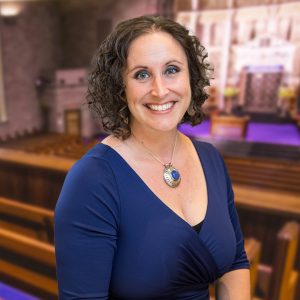 By Megan Fitzpatrick
By Megan Fitzpatrick
I catch Shayna’s attention in the golden-hued lobby of the historic synagogue of Congregation Rodeph Sholom, walking past a myriad of smiling children beaming with excitement on a Friday morning. She has just finished her morning Shabbat lesson at the congregation’s Day School, which I could tell was the highlight of her day so far.
We sit in her office as she recalls her journey to becoming Senior Cantor, a position she has held proudly for the last two years. Her journey, she says, was an unconventional one. Having grown up and attended a small congregation in southern Missouri with no traditional links with the cantorate, De Lowe never envisioned herself as a cantor. “I found my way to the cantorate via summer camp,” she says. Her singing and leading services at the camp got her noticed by a visiting rabbi who suggested to her at 16 that she become a cantor.
Following her undergraduate degree in music, she dedicated herself for a year to learning Hebrew, self-taught, and passed a test, gaining her entry into the Hebrew Union College-Jewish Institute of Religion’s School of Sacred Music here in New York. She spent two years in Israel as part of her studies at the seminary but notes she felt more of a culture shock coming from southern Missouri to New York than to Israel.
During her studies at the seminary and her job search, she found her way to an internship teaching B’nai Mitzvahs with Congregation Rodeph Sholom. She always believed she would return to the Midwest after she graduated but was hesitant to do so because cantors are not often part of the clergy due to the small size of the congregations. “My synagogue at home could fit into one room in this building.”
When she was ordained, a job opened up at Congregation Rodeph Sholom. “This was my first or maybe second interview…and I got the job and took it and canceled the rest of the interviews.” 16 years later, she can recall her beginnings at the congregation as if it were yesterday.
Being unfamiliar with the idea of the role of a cantor and fascinated by the arrangement of the leading figures in the synagogue, I curiously pose, “What is the hallmark of a good cantor?”
“In the past, the answer would be easy. You perform, inspire awe with music. [It was] a lot about the performative aspect, whether it’s yourself performing or gathering people into a choir.” It is still a part of her job, but she has picked up more and more duties as the role has evolved over the years. To her and the congregation, cantor doesn’t just mean singer. The cantor is a full clergy person, she describes. She can perform weddings and funerals, and all things rabbis can do, but with a slight edge: the musical connection. However, at Rodeph Sholom, everyone is encouraged to break the division. “Our Rabbi tells us, ‘I want cantors to speak and rabbis to sing.’”
The role of cantor has broadened over the years, she explains, and this has led to the whole clergy at Rodeph Sholom reevaluating the present and the future of this ever-evolving congregation with a strategic plan. “We stand on the shoulders of this 181-year-old congregation.”
This work has led to the necessary introduction of inclusive programming at the synagogue. De Lowe felt that making accommodations for anybody who needs them was at the forefront of the changes to be made and has allowed her to branch out into social action. Her involvement in a special needs worship service called Shireinu (Our Songs) and a special needs B’nai Mitzvah program, and her launching of a one-of-a-kind American Sign Language adult choir has allowed members with specific needs to be actively involved in services. This all came from a shared vision between clergy and congregants.
De Lowe, who has a Deaf son, explains that only two or three people in the ASL choir, who sing and sign at the same time, knew how to sign previously. “We always ensure [the prayers] are interpreted by a Deaf person. We are signing in ASL, so we’re signing the translations of prayers that are in Hebrew.”
The Hanukkah service on Friday will feature an all-ages and diverse choir, including the first live performance of the ASL choir since the pandemic began. I was curious about famous Hanukkah songs and wondered if Adam Sandler’s “The Hanukkah Song” was the only one. De Lowe names a few of her favorites which are frequently played at services like “Ma’oz Tzur”, and a song specifically written for Rodeph Sholom by Eliot Bailen called “Raise Up the Menorah.” (Unfortunately “The Latke Song” by Debbie Friedman is not one of them, but a guilty pleasure of De Lowe’s.)
The wonderful choir, led by De Lowe, can be heard at Friday’s service, streamed online on the congregation’s website.
